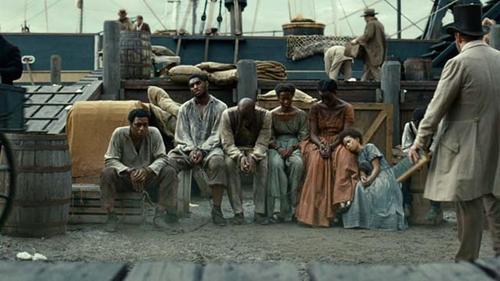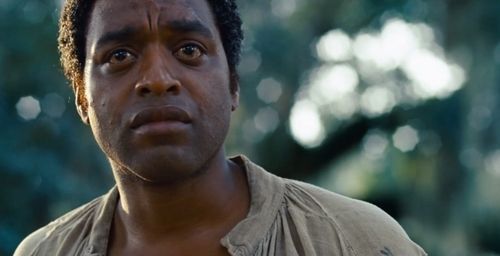The scene is iconic even to those who haven’t read the book or seen the movie: Alex DeLarge, wrapped in a straightjacket and bound to a chair, eyelids held open by metal clips, forced to watch horrifying images with no means of escape, nothing to do but confront them. He wants to look away, but he physically cannot.
The circumstances under which Alex DeLarge is rehabilitated in A Clockwork Orange are extreme to say the least, but, despite their dystopian and literary roots, I couldn’t help of being reminded of them while watching director Steve McQueen’s latest film, 12 Years a Slave.
Can a film with hard-to-watch content be reconciled by impeccable artistic style? This is a question many film financiers ponder when deciding when and where to dole out their money, but just this year we’ve seen two major films that have challenged it head-on. First was Denis Villenueve’s explosive thriller Prisoners, a child kidnapping and its brutal aftermath told through a dark, somber, yet strangely beautiful lens, and that, working in tandem with great acting and genius writing, helped overcome and elevate a touchy subject.
With 12 Years a Slave, Steve McQueen continues what he started with his first two features Hunger and Shame — creating stories that emotionally and physically bare all (in the case of Shame, very physically) — and turns his distinctive style fearlessly to the institution of American slavery in the 19th century. While there is no, per se, right or wrong way to make a movie, no one wants to watch a depressing film about a sensitive and complex subject without feeling that the filmmakers are treating it with the respect it deserves. There are few topics more sensitive and complex than American slavery, so McQueen had his hands full in sculpting a film that doesn’t hide behind any bells and whistles but is rather a visual tone poem to a sorrowful and tragic era in our collective past.

If this review reads like I am trying to work out my feelings towards 12 Years a Slave, that’s because I am. McQueen’s film is incredibly complex and deserves discussion both for its visceral and faithful true story, and for its brave stylistic choices in writing, directing, and acting to bring that story to the screen. It tells the story of Solomon Northup, a free black man in antebellum New York, who is kidnapped and sold into slavery in the Deep South. The title of the movie tells you the duration of this ordeal, but does not prepare you for what you will experience for the next two hours and change—an unflinching, harrowing depiction of a brutal, unrelenting system that was seldom questioned in the era and time in which the film is set. It’s an incredibly tough movie to watch, but I urge you to stay focused to every minute of it—because there is certainly a ton to dissect, historically and cinematically, and a monumental amount from which to learn.
And I urge you to do so because you really do have a choice. Here is where I submit what I am dubbing “the Alex DeLarge effect.” What it boils down to is simple: when watching a movie, don’t look away. Tense? Uncomfortable? Horrified? Odds are, everyone around you is too. Embrace it. If a scene in a film is hard to watch, whether it be because of grossness or tension or graphic cruelty, I believe an incredible catharsis can be brought on by just not giving yourself the satisfaction of looking away. In 12 Years a Slave, it’s clear McQueen understands this and facilitates towards these ends, as the most brutal scenes are shot with very little (if any) cuts. As an audience member, there is no hiding from the brutality, and you unknowingly enter into a contract to endure this when you buy a ticket. There is no respite in the explicit scenes of whipping and lynching, no breathing room in the emotional and physical abuse and repugnant, overt racism. Sitting there in the theatre, you are a modern twist on Alex DeLarge, staring down the barrel of a very real history, except you have the option of turning away. Despite all feelings to the contrary, I would argue that you don’t.

12 Years a Slave works when it is creating a vivid portrait of American slavery, which has rarely been done to this degree before. It works when the cast of world-class actors, led by Chiwetel Ejiofor (an incredibly underrated actor I am thrilled is finally getting the attention he deserves) as Solomon Northup and Michael Fassbender (at his most despicable) as the violent slave-master Edwin Epps, are given potent dramatic scenes in which to play off each other. It works as a glimpse into the past as a means of considering our future. In these ways, 12 Years a Slave lives up to the hype and is simply a landmark. However, 12 Years a Slave doesn’t work in some crucial ways—as a narrative, as a movie, it underwhelmed me.
From the moment Solomon is kidnapped, the drive of the film is clear—Solomon is Odysseus trying to get home, and the tribulations of the next twelve years are the obstacles in doing so. However, this ends up falling flat because the passage of time is basically not portrayed at all, not in the physical appearance of the characters and certainly not in the narrative, and therefore the film never truly engages, and occasionally loses sight of, the story it is trying to tell. In addition, the decision at the writing level to tell the whole story from Solomon’s point of view is incredibly brave, but ends up reducing many other characters—characters who become crucial in the story’s resolution—as simply two-dimensional caricatures (including a truly odd cameo from Brad Pitt, who produced the movie and included himself in the role of the one moral white guy—imagine if he had played Fassbender’s role instead?). These two things combined for me so that the ending of the film was strangely unsatisfying from an emotional standpoint. The lack of narrative urgency plus our lack of sympathy for or understanding of pivotal supporting characters left me unfortunately and disappointingly numb. The real-life story doesn’t necessarily have a natural climax, and while I respect the filmmakers’ choice to not shoehorn one in, I found myself wanting more from the writing, especially when the directing and acting and technical aspects had so floored me.
If, at this point, you’re thinking “boy, he’s doing a really shitty job at recommending this movie,” I would agree. The fact is, this is an extremely difficult movie to recommend. Not because it doesn’t have merits, which it certainly does, but because it is a slow-paced, hard-to-watch 134-minute long slavery drama that I can’t even guarantee will satisfy you emotionally. You know yourself better than I do, so if that doesn’t sound like your thing, there are plenty of other movies out there. But if you want an important, imperfect film, superbly directed and compellingly acted, that pits the audience against the demons of a communal atrocity in hopes of much-needed self-reflection and catharsis, then there is no other film this year to watch. Buy your ticket, enter into that contract, sit back, and don’t look away.
GRADE: B
WHAT TO WATCH NEXT: Besides McQueen’s previous films Hunger and Shame, I would recommend checking out Chiwetel Ejiofor’s second best performance, 2002’s Dirty Pretty Things (directed by Stephen Frears and written by Steven Knight—one of the five best screenwriters on the planet).
Catch the trailer for ‘12 Years A Slave’ here.
